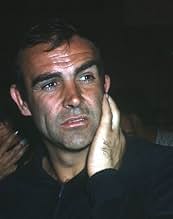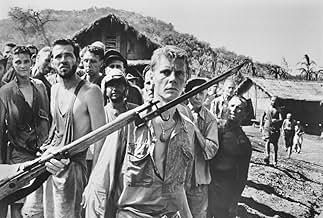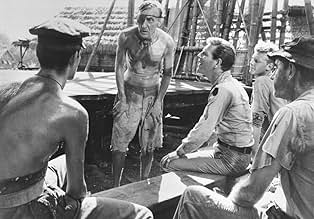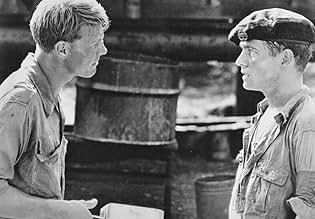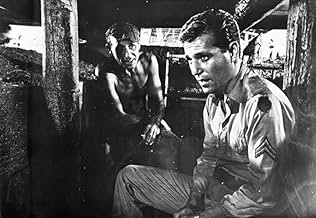NOTE IMDb
7,5/10
5,3 k
MA NOTE
Dans un camp de prisonniers de guerre en Birmanie pendant la Seconde Guerre mondiale, le rusé caporal King (George Segal), utilise la corruption et le vol pour prendre le contrôle du camp.Dans un camp de prisonniers de guerre en Birmanie pendant la Seconde Guerre mondiale, le rusé caporal King (George Segal), utilise la corruption et le vol pour prendre le contrôle du camp.Dans un camp de prisonniers de guerre en Birmanie pendant la Seconde Guerre mondiale, le rusé caporal King (George Segal), utilise la corruption et le vol pour prendre le contrôle du camp.
- Réalisation
- Scénario
- Casting principal
- Nommé pour 2 Oscars
- 3 nominations au total
Joe Turkel
- Dino
- (as Joseph Turkel)
Michael Stroka
- Miller
- (as Mike Stroka)
Avis à la une
I saw this movie again recently and had forgotten how great it was. It shows how people behave towards each other when the thin veil of civil society is torn away.In a brilliant performance, George Segal plays the wheeler-dealer 'King Rat, a cynical hustler whose only real interest is himself. His counterparts in the Japanese POW camp are the British officers who seem to maintain the rules and courtesies of civilized life. As the movie, unfolds, though, we see the senior officers using their position to steal food from the lower ranks. Even the British provost marshal, or camp policeman (another great performance by Tom Courtenay), is shown to be a weak character, vengeful and sanctimonious, who must believe in retribution to bolster his fragile ego.
'King Rat's' one true friend in the camp is played by James Fox. But the Segal character can't really be a friend to anyone. One of the prices of cynicism is emotional shallowness. In the end Segal tells his best friend - 'You worked for me, I paid you a few bucks, that's all there was between us.' The film makes it clear that the action applies to the wider world. Unlike the other prisoners, the Segal character is neither shocked nor excited by liberation. To him, the everyday world is as pitiless as the POW camp.
'King Rat's' one true friend in the camp is played by James Fox. But the Segal character can't really be a friend to anyone. One of the prices of cynicism is emotional shallowness. In the end Segal tells his best friend - 'You worked for me, I paid you a few bucks, that's all there was between us.' The film makes it clear that the action applies to the wider world. Unlike the other prisoners, the Segal character is neither shocked nor excited by liberation. To him, the everyday world is as pitiless as the POW camp.
It has always bothered me that King Rat is so underrated. On one list of top the thousand films in history, it gets no mention. I think it's because George Segal's character, Corporal King wasn't a totally likable person. He is not the standard Hollywood hero. But he is a hero of mine. Were I in that prison camp, I guarantee you, I would have been Corporal King's best friend. One thing I learned in life was how to survive, and everyone around Corporal King survived. The movie misses a very important point that was in James Clavell's novel on which it is based. In case the war turned bad for the Japanese and they started taking revenge on the prisoners, King had planned an escape route. Not just for himself, for everyone close to him. Put that in the film and you've got a major American hero. The movie is totally cliché free. One never knows where it is going or how it is going to end. Winning the war, you see, will not guarantee the safety of the prisoners. How it ends is perfectly logical in retrospect, but difficult to predict. It is a near perfect motion picture.
Many unforgettable films are to be found in the annals of World War II. Avid movie goers know which ones they are. Among my favorites are 'The Great Escape, The Blue Max, Cross of Iron, and of course, Sink The Bismark," But occasionally, a film is made which deviates from the superficial and ventures into the realm of the incredible. That is the essence of "King Rat." Here viewers are exposed to the harsh realities of what it takes to survive in a hell hole, like a Japanese Prisoner of War Camp. Our hero, one, Cpl. King (George Segal) dwells amid hundreds of starving British and a few American P.O.W.s. However, unlike the rest, who are seen as listless, emaciated and dying , King is for the most part, healthy and appears none the worse for wear. One individual who daily wants to know why King, walks about nearly impervious to the obvious conditions is Lt. Robin Grey (Tom Courtenay, convincing in this role). It is his job as Camp Provost Marshal, to maintain order in a camp where smuggling, trading with the enemy and outright theft is common place. Knowing King is secretly dealing with the enemy, Robin daily waits for him to make a mistake. This will be difficult as King relies on the fact, everyone, regardless of rank seeks to stay alive by whatever means. Aiding King is Peter Marlowe (James Fox) who despite his higher rank readily joins King's other 'employees' such as Tex, (Todd Armstrong), Top Sgt. Max (Patrick O'Neal, Lt. G.D. Larkin, (Denholm Elliott), and Col. George Smedley-Taylor (John Mills). But it is the camp Doctor (James Donald) who asks the pertinent question of King. "What is your secret Cpl? Medically, it should be worth a fortune." Throughout this stark and tragic Black and White film, one is equally curious, until we discover King's dark secret. Once we know it, the anger is dissipated by the fact, the war will eventually be over. Then Cpl. King will be called upon to reveal it. A superior movie with top notch acting by every actor. ****
I saw this grainy black and white film sometime in 1967 one steamy evening in a tin hooch Army movie theatre at TSN airfield on the outskirts of Saigon. The movie was punctuated by the sounds of mortars on the perimeter and the occasional flash from an aerial flare. I never forgot it. It rang true there. So true that no-one could say a word after. We just got drunk -- as usual. I haven't talked to many others who saw this movie. It hit right in the middle of the rising tide of despair over Vietnam. And since it wasn't actually an anti-war movie, I think it went nowhere. I believe it's origin is a short novel, possibly autobiographical by J.B. Clavell, author of Tai Pan and other sagas set in the 19th C orient. No matter what George Segal has done since, I have known that he has the heart of a rat. His King was a natural ruler in a perverse state of nature -- and his fate the fate of all maverick rulers in the end. If you can find it and see it, it will take on the character of a lost dream.
I had never heard of this movie. It came on late one night on cable and I watched it. I was very impressed. The performances in the movie are Oscar caliber. George Segal gave probably the best performance of his career. He plays an American stuck in a Japanese POW camp who manages to always make some dough on the side. He is manipulative and arrogant but his performance is credible and appealing. Also, the way the camp itself is projected as a miserable, fly-infested, hot and godawful hellhole is hard to forget.
James Fox also gives an outstanding performance as Segal's British counterpart who come under Segal's spell and begins to do alot of his dirty work for him. This is a movie you will not soon forget. Now, keep in mind that since this movie was made in 1965, it is tame in terms of its depiction of violence but that does not take away from its overall message. Great movie!
James Fox also gives an outstanding performance as Segal's British counterpart who come under Segal's spell and begins to do alot of his dirty work for him. This is a movie you will not soon forget. Now, keep in mind that since this movie was made in 1965, it is tame in terms of its depiction of violence but that does not take away from its overall message. Great movie!
Le saviez-vous
- AnecdotesDue to the cast, director and setting, this is often assumed to be a British movie, but it was entirely filmed in California.
- GaffesThe shoulder patch that Cpl. King (George Segal) is wearing is that of the 34th Infantry Division (Red Bull). The 34th ID served in the European Theater of Operations, not in the Pacific. The 34th ID patch is a black Mexican water jug called an "olla" with a red bull's skull superimposed. Almost all the POWs at Changi were British or Commonwealth soldiers captured at the surrender of Singapore on Feb. 15, 1942, but there also were POWs from the Netherlands East Indies, which surrendered in March. The only sizable U.S. unit at Changi was Co. E, 2nd Btn, 131st Field Artillery Regt., part of the Army's 36th ID (the "Texas Division"). The Second Battalion, which became known as the Texas National Guard's "Lost Battalion," was detached from the 36th ID in the States and shipped to the Pacific in November 1941, but when the Japanese attacked the Philippines in December, the battalion's convoy was diverted from Manila to Brisbane, Australia. In January the battalion was sent to Java, in the Netherlands East Indies. The battalion was the only U.S. ground unit in Java when the NEI surrendered to the Japanese on March 9, 1942. Most men in the battalion were transferred to Singapore later that year and, along with thousands of British and Commonwealth soldiers, were used by the Japanese as slave labor to build the infamous "Death Railway" connecting Bangkok to Rangoon. Company E of the 2nd Battalion, separated from the rest of the unit on Java, was at Changi briefly in October-November 1942 before being sent to Japan as slave laborers. It would be plausible that Cpl. King was a member of 2nd Battalion, 131st Field Artillery, and that the movie's costumers got the wrong division patch for his uniform.
- Crédits fous[Prologue] This is not a story of escape. It is a story of survival.
It is set in Changi Jail Singapore, in 1945
The Japanese did not have to guard Changi as a normal prison of war camp. The inmates of Changi had no friendly Swiss border or any other neutral country within reach. They were held captive not so much by high walls, or barbed wire, or machine-gun posts, but by the land and sea around them - and the jungle was not neutral, nor was the ocean.
They did not live in Changi. They existed. This is the story of that existence.
- ConnexionsFeatured in Le choix d'une vie (1999)
- Bandes originalesAdeste Fideles
(uncredited)
Written by Frederick Oakeley (1841)
Variation sung in distant background by POWs
Meilleurs choix
Connectez-vous pour évaluer et suivre la liste de favoris afin de recevoir des recommandations personnalisées
- How long is King Rat?Alimenté par Alexa
Détails
- Durée2 heures 14 minutes
- Couleur
- Rapport de forme
- 1.85 : 1
Contribuer à cette page
Suggérer une modification ou ajouter du contenu manquant



